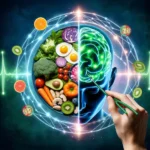**How Diet and Nutrition Influence Your IQ: Unveiling the Connection**
IQ, or Intelligence Quotient, has long been a metric used to gauge an individual’s cognitive abilities. It’s a score that captures aspects of intelligence, problem-solving skills, and other facets of mental acuity. However, what many might not realize is that aside from genetics and environment, diet and nutrition play a crucial role in shaping and potentially boosting your IQ. Understanding the interplay between what you eat and your cognitive function can unlock the potential for improved mental performance.
### Brain Food: Nutrients That Boost Brain Power
The brain is an energy-intensive organ, consuming about 20% of the body’s calories. Therefore, it requires a constant supply of nutrients to remain in peak condition. Certain nutrients have been identified as particularly important for brain health and, by extension, cognitive functions including IQ.
**Omega-3 Fatty Acids:**
These essential fats, particularly DHA, are critical for brain health. They’re found abundantly in fatty fish like salmon and play a role in building brain and nerve cells. These fatty acids are pivotal for memory and learning, and their deficiency has been linked to learning impairments.
**Antioxidants:**
Vitamins A, C, and E act as antioxidants that protect the brain against oxidative stress. Berries, nuts, and leafy greens are rich in these vitamins and can aid in preventing cognitive decline.
**B Vitamins:**
B vitamins, particularly B6, B12, and folic acid, are known to reduce levels of homocysteine in the blood. Elevated homocysteine levels have been associated with cognitive decline and neurodegenerative diseases.
**Iron:**
Iron is instrumental in cognitive development. Iron deficiency is one of the most common nutritional deficiencies, and in children, it has been correlated with decreased cognitive function and lower IQ scores.
**Iodine:**
This micronutrient is crucial for brain development, especially during pregnancy and infancy. Lack of iodine can lead to learning disabilities and lowered IQ in children.
### Does Nutrition Affect IQ Throughout Life?
Many studies suggest that the impact of nutrition on IQ is most pronounced during critical stages of brain development – from pregnancy through early childhood. For instance, adequate nutrition during pregnancy and in the first years of a child’s life is essential for brain development and can have lasting effects on IQ.
However, the brain continues to develop and is capable of change throughout life, a concept known as neuroplasticity. Good nutrition can enhance cognitive function and protect against cognitive decline even in adulthood and old age. While it may not significantly alter a matured IQ score, it can help maintain cognitive health.
### The Role of a Balanced Diet in Cognitive Performance
A balanced diet that incorporates a variety of these brain-boosting foods can help optimize cognitive function. To support brain health and potentially affect IQ, consider the following dietary suggestions:
– **Incorporate Omega-3-rich foods:** Include fish, flax seeds, and walnuts in your diet.
– **Eat colorful fruits and vegetables:** These provide a range of antioxidants to guard against cognitive decline.
– **Choose whole grains:** These help maintain stable blood sugar levels, providing a steady supply of energy to the brain.
– **Enhance your iron intake:** Opt for lean meats, beans, and fortified cereals to prevent iron deficiency.
– **Include iodine-rich foods:** Seaweed, dairy, and iodized salt can help meet the recommended iodine intake.
### Final Thoughts
While a definitive answer on whether diet and nutrition can have a profound effect on one’s IQ is complex and multifaceted, it’s clear that these factors are integral to supporting optimal brain development and function throughout life. A diet rich in essential nutrients can not only contribute to overall health but also enhance cognitive abilities and maintain them as we age. Consequently, paying attention to your dietary choices can be a smart move for your brain’s health.
As ongoing research continues to delve deeper into the connection between diet, nutrition, and intelligence, what remains certain is the importance of nutrient-rich foods in maintaining cognitive vitality. Adopting a balanced diet is a proactive step towards not just a healthier body, but also a sharper mind.

